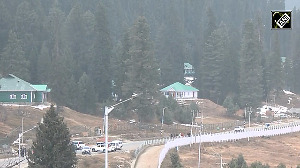Sharjah-based marketing executive Vijay Raghavan has sent the 264 bonds he got in lieu of the Unit Scheme 64 certificates he held since 1990 to the Special Undertaking of UTI. Though he has not firmed up his investment plan, Raghavan is expecting a refund soon.
Raghavan, who paid over Rs 1.5 lakh to acquire the units, is among the 1.3 million US 64 bondholders whose investment would mature with the death of India's first mutual fund scheme. In July, the scheme would have turned 44 years.
The scheme, which has helped many Indians to marry off their daughters or pay for their children's education, saw a rough ride since the second half of 1990s. That prompted Raghavan's Bengaluru-based relative T Varadarajan, a retired bank executive, to exit in 1998 seven years after he bought 1,000 units. "I needed money since I was retiring and so I decided to redeem the units," he said.
Similarly, P V Shah, a 49-year-old chartered accountant, entered the scheme in the 1980s, as it was seen as a safe investment that earned handsome tax-free returns.
While he purchased the units at around Rs 13 each, in May 2003, he sold them at around Rs 14 each. "I recovered my investment and also earned a handsome dividend for a long period," he says.
While Shah's parents were also late entrants to the scheme, many of their generation joined the scheme in 1964, when the government introduced it as part of a drive to step up small savings and boost investment.
In 1963, a team comprising officials from the finance ministry and the Reserve Bank of India went to the US and the UK to study ways to generate small savings and recommended the establishment of UTI.
In November, a Bill was moved and UTI was set up. In July 1964, US 64 was launched with tax benefits for individual investors. The idea all along was to make the scheme an unprecedented success and the government also anticipated that there would be a tremendous response to the scheme from UTI, which was billed by the then finance minister T T Krishnamachari as "adventure in small savings".
Some 100,000 applications were received and mopped up Rs 20 crore in the first year alone. It took nearly two months to process the applications.
Recalls a former employee who started his career at UTI, "The product was never sold as a mutual fund and the number of investors was always a big thing for us. Though UTI never assured returns, it was taken for granted that the returns will come. To keep investors interested, UTI offered additional units at lower rates. At times, the difference would be as high as Rs 2-3."
The scheme was originally intended to be a balanced scheme with book closure in July and a net asset value to be fixed for sale and purchase. But over the years it turned into a scheme with administered price and an equity bias, with many penny stocks. What also hit the scheme was the high dividends paid between 1994 and 1999.
"The rates offered were at the discretion of the person at the helm of affairs. Someone would offer Rs 18; the next would offer Rs 22 as dividend. It was almost a case of one-upmanship that led to the problem," the ex-employee says.
Suggestions to convert US 64 into an NAV scheme with a lower equity bias were ignored. In 1999, the government bailed out UTI by infusing Rs 3,000 crore in return for shares of listed public sector companies, which were worth Rs 1,700 crore.
But that did not suffice and after the stock market crash in 2001, on July 2, UTI announced a freeze on repurchase of units, creating a nationwide furore. In December 2001, there was a fresh bailout and redemption resumed. Then came the bonds.
On Sunday, the bonds will expire and US 64 will die at the age of 43 years 10 months.
Additional reporting with Joydeep Ghosh and Sidhartha






